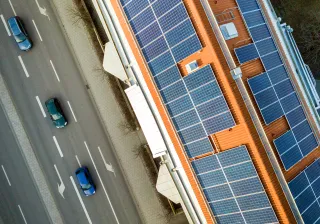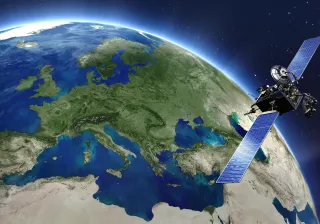Technology is developing faster and becoming more powerful than ever. Exponential technological capacity means increasing problem-solving skills across the board – but it also means a capacity to cause exponential negative impacts - or externalities.
It is clear to see that the cumulative impact of eight billion people powered by unprecedented technological capacities are already hitting planetary boundaries on a myriad of metrics. It is obvious that we cannot continue running exponential externalities on a finite playing field.
We have entered the Anthropocene, where technology has granted us the power to impact the world around us even more than the forces of nature themselves - metaphorically speaking, we now possess the power of gods. While we can do immense good, we can also destroy ecosystems and create new lifeforms from scratch. With this god-like power, we also need to possess the wisdom of gods to guide technological development. This is why it is crucial for us to focus on both optimizing positive impact and minimizing harm in our pursuit of progress.
Technology is not merely “a solution”
We argue that the very way we currently develop and apply technology should be seen as a part of the problem space – not only the solution space. This is currently not the case. We have strong incentives on all levels of society to focus on the opportunities of new technologies and to downplay the risks. Think about first-to-market-advantage, startup funding, research funding, and impact evaluation frameworks, for example.
In a sense, we are all incentivized to run increasingly fast in a dense forest in twilight.
Part of the solution is an ability to understand the big picture better, with all its interdependencies, complexities, and ethical considerations. We need to be able to continuously switch perspectives between a big picture view and whatever sub-context we are currently working on. If we don’t do this, we increase the likelihood of - on one hand - being ineffective in achieving our objectives and, on the other - causing unintended consequences in other parts of the system.
If, for instance, we are working on energy innovation, we need to be aware of the fact that there are phenomena such as the Jevon’s paradox, which states that whenever you increase energy efficiency (say, change incandescent bulbs to LED lights) the global energy consumption doesn’t decrease - in fact, it often increases. This phenomenon is due largely to rebound effects, where the increased efficiency opens new market niches that were not previously profitable. Hence, overall energy consumption is likely to increase.
For the innovator working on new energy solutions, this poses deep questions about how to achieve further energy efficiencies, but also about how innovation could lead to actual decoupling on a global level. And in the case that this is not possible, questions about what would then need to change in the underlying incentive landscape for global consumption not to spiral out of hand? Here we can witness the problem landscape quickly escalate from a predominantly technological challenge to a socio-technological and political-economic challenge.
So yes, we need radical innovation, but it needs to be technological, social and cultural - all simultaneous.
A question of ethics
We argue that technology developers and the science community themselves have an ethical responsibility to explore new ways to better balance the positive and negative impacts of technological innovation.
While more agile regulation and top-down steering mechanisms will be required, we also need to change our own intrinsic motivation, develop new skills and capabilities and approaches for developing innovations.
As part of the renewing VTT iBEX innovation programme, we proposed a set of orienting questions to better guide the development of adequate solutions to our global problem landscape. These questions are not intended to replace any external evaluation framework but could function as a set of guiding principles that teams can use as a checklist to maximize positive impact, while minimizing harm:
- What physical externalities might your solution result in if it were successful? What is the process for factoring these externalities?
- What psycho-social externalities might your solution result in if it were successful? What is the process for factoring these externalities upfront?
- What are all the underlying causes of the problem and how are you addressing them? If you are not addressing the causes, what other effects will these causes still have?
- Where are there systemic perverse incentives that would orient other actors to make your job of solving the problem more difficult? How would you address those perverse incentives?
- How could you address transparency and accountability in the system to address perverse incentives?
While we have argued that the way we have traditionally developed technology has played a key role in causing many of our current problems, we are convinced that it will also play a key role in responding to them. After all, we cannot put technology back in the box, and any theory of change that doesn’t involve modern technology will simply just lose in the great game of power. We just need to think about innovation in a more systemic and future-oriented way. What this means will be discussed in the blogs to come.
By Katri Kallio and Thomas Holm
The discussion on this topic will continue in a panel at SuomiAreena on 30th June at 14-14.45 at Puuvilla shopping centre in Pori.
Katri Kallio is Lead of Futures at VTT. Her current focus is on developing VTT's strategic foresight capability towards more holistic approach. She is a learning professional who aims to strengthen dialogue and mutual understanding of the constant change of the world and what requirements it sets for development of technologies and innovations.
Thomas Holm is the co-founder of Leapfrog Projects, an innovation consultancy. His current focus is on understanding the impacts of technological innovation in complex systems from individual organizations to society at large.
- Previous blog by Katri Kallio and Thomas Holm: What got us there will not get us there
- VTT Futures Perspectives white paper: Beyond deep tech
- VTT Futures and iBEX: Building future capabilities: Scaling learnings & societal engagement











